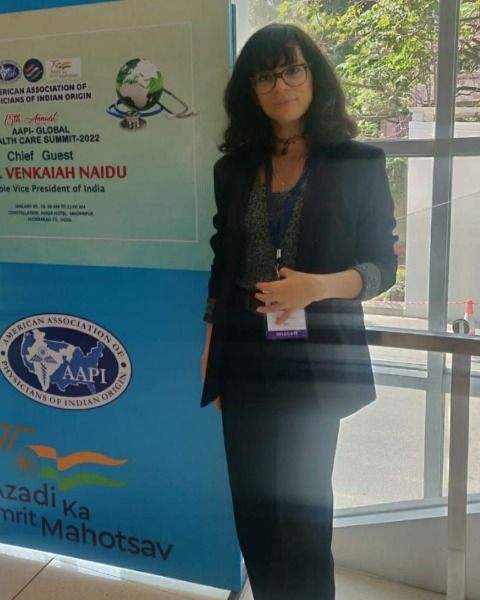Oncology
H3K27M Mutation: A Predictor of Intracranial Metastasis in Patients Undergoing Surgical Resection of Intramedullary Spinal Astrocytomas
Friday, February 21, 2025
7:00 AM - 2:00 AM EST

Bhavya Pahwa, MBBS
Med Student
UCMS and GTB Hospital
Amritsar, IN
Presenting Author(s)
Introduction: Continuing research has led to the introduction of new markers that may be used to predict the outcomes of spinal astrocytomas (SA) and H3K27 mutation is one of them. H3 K27M-mutant tumors are uncommon and rare presentations which make their management delayed, cumbersome and confusing. The aim of this study was to establish the association of H3K27 mutation with outcomes in patients undergoing surgical resection of SA
Methods: All adult patients with a follow up of atleast 12 months undergoing resection of SA were included in this study between the years 2016 to 2021. Specimens of resected SA were tested in the neuropathology lab. Immunohistochemistry with the corresponding antibodies was used to evaluate the H3K27M-mutant status (ABE419; Milli- pore, Billerica, MA, USA; 1:800). The patients' clinical outcome was measured using Modified McCormick scale (MMS) while MRI was used for surgical outcomes.
Results: 71 patients with a mean age of 33.07yrs were included in the study. Twelve patients (17%) had a H3K27M mutation. There was no significant difference in the MMS immediately postoperatively (p=0.725), at discharge (p=1.000) or at last month follow-up (p=0.354) between the patients with and without H3K27 mutations. For surgical outcome, it was observed that though the patients with and without the mutation had comparable recurrence and residual rates, the rate of intracranial metastasis was significantly higher in patients with H3K27 mutation (42% vs 1.7%, p=0.003). There was a signifiant difference in the median overall survival of the two groups (72 vs 15 months, p< 0.001)
Conclusion : Patients with H3K27 mutation must be managed with a holistic approach consisting of aggressive treatment options to avoid intracranial metastasis and improve their survival rates.
Methods: All adult patients with a follow up of atleast 12 months undergoing resection of SA were included in this study between the years 2016 to 2021. Specimens of resected SA were tested in the neuropathology lab. Immunohistochemistry with the corresponding antibodies was used to evaluate the H3K27M-mutant status (ABE419; Milli- pore, Billerica, MA, USA; 1:800). The patients' clinical outcome was measured using Modified McCormick scale (MMS) while MRI was used for surgical outcomes.
Results: 71 patients with a mean age of 33.07yrs were included in the study. Twelve patients (17%) had a H3K27M mutation. There was no significant difference in the MMS immediately postoperatively (p=0.725), at discharge (p=1.000) or at last month follow-up (p=0.354) between the patients with and without H3K27 mutations. For surgical outcome, it was observed that though the patients with and without the mutation had comparable recurrence and residual rates, the rate of intracranial metastasis was significantly higher in patients with H3K27 mutation (42% vs 1.7%, p=0.003). There was a signifiant difference in the median overall survival of the two groups (72 vs 15 months, p< 0.001)
Conclusion : Patients with H3K27 mutation must be managed with a holistic approach consisting of aggressive treatment options to avoid intracranial metastasis and improve their survival rates.

.jpg)